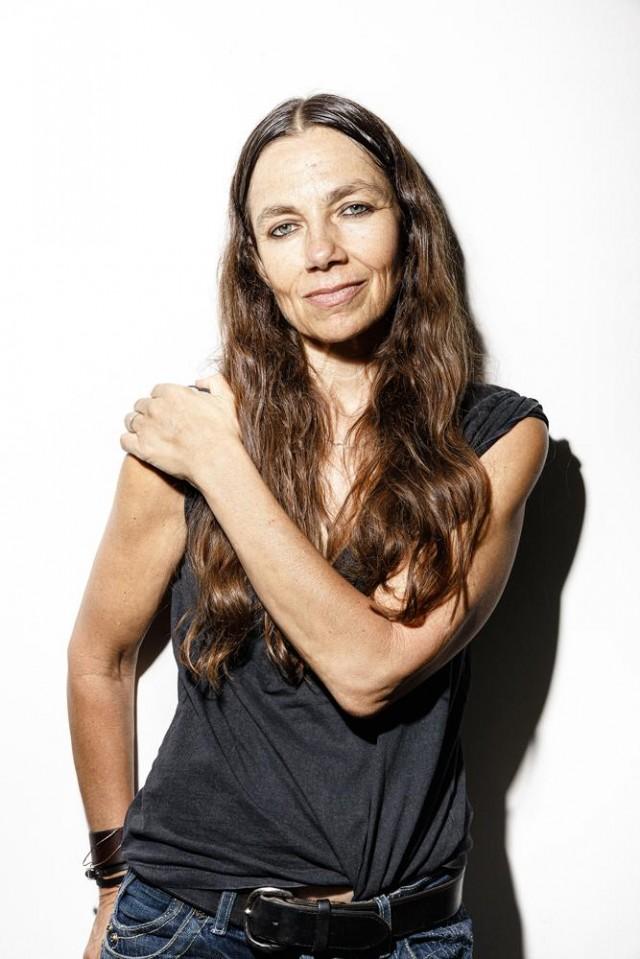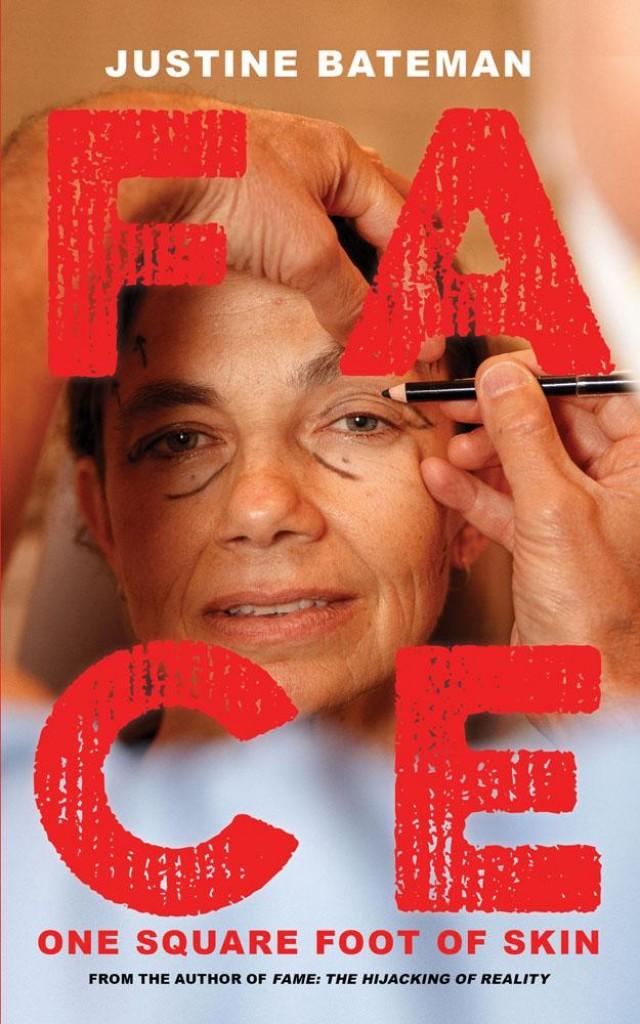Justine Bateman on her new book, beauty, and getting older

Los Angeles – Remember Justine Bateman who played the teenager Mallory Keaton in the hit TV sitcom “Family Ties?” Along with Michael J. Fox, Meredith Baxter, Michael Gross and Tina Yothers, Justine continued her role until the show ended in 1989.
Now 55, the actress has appeared in other TV series like “Men Behaving Badly,” “Desperate Housewives,” and “Californication,” achieved her directorial debut, “Violet,” which premiered at the 2021 SXSW Film Festival, and most recently, came out with a new book.
Entitled “Face: One Square Foot of Skin," the book is made up of fictional vignettes that examines the fear and vestigial evolutionary habits that have caused women and men to cultivate the imagined reality that older women’s faces are unattractive, undesirable, and something to be "fixed."
Based on her own "older face" experiences — and those of dozens of women and men she interviewed — the book presents the reader with the many root causes offor society’s often negative attitudes toward women’s older faces.
In doing so, Justine rejects those ingrained assumptions about the necessity of fixing older women’s faces, suggesting that we move on from judging someone’s worth based on the condition of her face.
With impassioned prose and a laser-sharp eye, Justine argues that a woman's confidence should grow as she ages, not be destroyed by society's misled attitude about that one square foot of skin.

Below are excerpts of our conversations with Justine:
You were a teenager while doing “Family Ties.” Were you psychologically imbedded that you had to look a certain way?
I personally have not had any pressures or suggestions or anything about my looks, not as a writer/director/producer of course and not years ago when I was acting. I just didn’t happen to have that experience.
All the criticism that I encountered came from just regular people online and still to this day.
Do you think it is a good thing that you didn’t have social media then while you were making that show?
Oh gosh, I think social media is a tricky thing now. It can be a great way to connect with people and it can be just a horrible way to discover what everyone’s thinking. Some of that is better left unknown.
Do you think the Americans are more obsessed than their European counterparts?
They’re more obsessed with it, I believe so. I can’t speak for Europeans but I do believe that Americans are much more concerned with what other people might think of them, what other people might conclude about them, that other people might disallow them from going forward or from getting the things they think they want out of life.
I think maybe because of that, they want to smooth the appearance to limit the ways that people can stop them, to say oh well, what if my face is completely smooth, you won’t criticize me now will you? That kind of thinking.
I can’t speak for Europeans, but I do find Americans very concerned about that, which is why I’m so happy to speak to you because it seemed to me to be much more of an American thought. Yet we’ve had Japan Vogue cover this. We’ve had Denmark. I’ve gotten lots of press and messages from people in Australia, Spain. So, it’s very interesting to me that’s why I was so interested to talk to you.
What is your definition of beauty?
For me, as far as people go, it’s confidence. When somebody’s really confident and comfortable with themselves, I find that extremely attractive, so that’s what I’m drawn to.
How do you think can we educate young girls to let them know that it’s OK for older women to show creases?
When I was a teenager — and I’ve mentioned this before and I talk about it in the book — I looked forward to looking like older European actresses because I was seeing films with Anna Magnani and Isabelle Huppert and Charlotte Rampling and they have very specific elements to their faces that I thought was really interesting. And they were very confident and excellent artists at what they did.
I wanted to have that kind of confidence and I wanted to be that interesting. I wanted to be as interesting as I thought they were. So, I have that to look at and I feel like the more women that are comfortable with themselves once they’re older the better.
I just feel like everybody’s responsible for their own path. I’m not here to change anybody else. I’m not here to change the beauty industry. I’m not here to make sure everybody changes their behavior. I’m really not.
My whole goal is, and I achieve it more and more every day, is to limit my buttons…so if a young woman, if she’s excited about becoming more herself as time goes on, that’s really something to look forward to, that’s what I would say about that. The rest of it is like, I don’t care.
If people want to keep using those silly fairytale words to describe older women, I don’t really care. It’s just telling me how limited their view is of the second half of their own lives.

What makes you feel confident about getting older? Where do you find this strength and confidence?
It really comes down to me being honest with myself about what fears I have like and for me, it's almost always been a rational fear. Like sometimes, I'll say oh, I felt fine until that one point at the grocery store or the party where I was like — well which point?
What happened like oh, it's when I saw that other woman come into the room. What popped into your head right there and then? I have to get down to like what was the exact moment where I felt I went off balance and then I need to write about it.
When I'm rational, I can look at that irrational fear and say huh, do I really think that's going to happen. I try not to judge it before I write it out. I write it out first and then yeah, that's it for me, like I just like about what people will think of me and stuff in different situations like is that really going to affect me or where I'm going professionally. No. I have to write out that irrational fear first. If I skip that step, then I'm just going to stay in the same place.
Men’s older face signifies power while women’s older face signifies loss of power. When do you think this transformation happened when women started to do surgery to have their faces totally redone?
I would love to look at the history of the obsession with the female face generally. That's a really interesting area, and that's not research that I did, but as far as like specifically plastic surgery like, when does it seem like that became more common.
I think it has to do with plastic surgery becoming safer, more affordable, more artistic if you will. It used to be a bad plastic surgery or nothing, right?
In America, there has never been a time where people are looking at themselves as much as they are now, because of social media. Like I said, there's good things about social media but one of the drawbacks is this constantly looking at themselves.
Then they introduce all these filters because people are constantly looking at themselves and then they become when you have your whole person sort of compressed into this 2-D representation. It eliminates a lot of other information about you like I would be getting a lot more information from you if we were in the same room having this conversation.
Then that worries people that oh, the representation of me is just this not my energy, not my body language fully. It's just this and a concern that not enough information or the wrong information is coming out of the state of this skin. All of that is conspired to push people towards this idea of like maintaining one's land and all of this. All of that has accelerated this obsession, at least in the U.S. with their faces. Just a fear.
The ‘60s and the ‘70s the women were totally free. Then something switched in the ‘80s with the top model fashion. Did you see a moment in which these things changed drastically?
That's a good point. As a teenager in the '80s, I know what you mean. But we had a lot of the beauty that was looked at in the '40s and '50s was also very smoothed over. It was very polished. It was the women in America had like this short hair and that sort of housewife dress and everything looked right.
In the '60s and '70s, there was a rebellion against that and then you had the big hair, big breasts, bright colors, money and cocaine and all of that of the '80s in America. That brought back that and then the '90s you had heroin chic and the dark clothes and you had that come back in 2000. I don't know what the style is anymore except surgery is the shame.
I think for a woman to really continue to develop as an individual, she has to have her own standards of beauty — what style she likes, what she wants to look like and do. Though one has to be willing to step away from the herd and some people don't want to do that.
You have been married for 20 years. Is your husband supportive of this with you?
Oh, yeah, he's very proud of me and my writing and filmmaking. Yeah, he's great.
So is health more important to you?
Is health more important to me than like wrinkles on my face and stuff? Yes, 100%. I'm really grateful and if I just think about my face itself, I'm really grateful that it functions properly.
And how do you stay healthy?
I really enjoy working out. That's something that I've always liked doing because it helps me think more clearly and I like to eat good food and just the normal things. Nothing special.
— LA, GMA News




